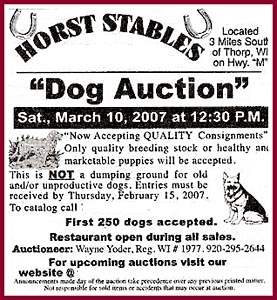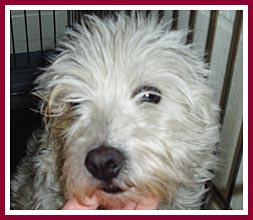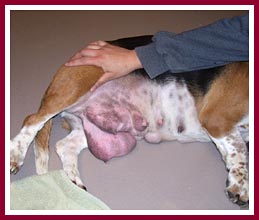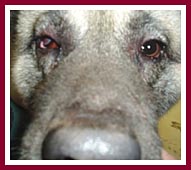"It's All About
the Money"
 "Now
accepting QUALITY consignments. Only quality breeding stock or healthy and
marketable puppies will be accepted." "Now
accepting QUALITY consignments. Only quality breeding stock or healthy and
marketable puppies will be accepted."
Clark County, Wisconsin, March 10th, 2007, 7am: my van is being loaded with
every available crate and carrier that we have. These early morning
"excursions" are a strange mix of tiredness and exhilaration. It must
be the feeling of adventure into the unknown that gets the heartbeat going
faster. I don't know what I'm going to see when I get to the auction. It's not
that this is my first attendance at such an event. I was at the
very
first one back in the Fall of 2006. It's more that you never know what
you're going to find, or what is going to happen when you get there.
There are not many people up at this hour on a Saturday, so traffic is minimal
and it gives me a lot of time to think as I drive the 50 miles to the auction
site. I ponder the same old questions.... Is buying a dog at the auction
helping the animal avoid a life of misery as a breeder in a puppymill or is it
merely contributing to the profits of a puppymiller now? Should anyone from a
breed rescue or an animal shelter be buying dogs?
 A million thoughts
race through my mind on both sides of the issue. As usual there are no clear
cut, easy answers. This is "hot button topic" among many animal
advocates. I decide once again to go with what my heart tells me is the right
thing to do. After all, that is why I am in this humane line of work. There's
just something that keeps me wanting to help animals no matter what the
circumstances are. A million thoughts
race through my mind on both sides of the issue. As usual there are no clear
cut, easy answers. This is "hot button topic" among many animal
advocates. I decide once again to go with what my heart tells me is the right
thing to do. After all, that is why I am in this humane line of work. There's
just something that keeps me wanting to help animals no matter what the
circumstances are.
In
this case, I can not in good conscience ignore the fact that any
of the dogs that are not purchased by rescues or shelters will most likely end
up in misery in someone's breeding kennels for the rest of their
"useful" life. Once again, I have been able to reassure myself that
this is the best thing to do this time.
As I approach the Horst Stables (just south of Thorp, Wisconsin), I am thinking
about how many dogs I will see, how many I can save from their "other
destiny," what will the conditions be in the building, how will I decide
which ones to bid on and which ones to leave.
As
I enter, I notice that they do not have a sign up on the door like last time --
"No Cameras Allowed." After that sign was posted last fall, they
realized that people can also take pictures with their cell phones, so about
half an hour after the camera sign went up, someone added "or cell
phones" to the bottom. I had my camera along with me and tried to quickly
shoot a picture but one of the "auction assistants" came right over
and said "No pictures allowed. Put the camera away or you have to
leave."
 I know that the Amish
or Mennonites are adamant about not having their pictures taken but should that
extend to pictures of the dogs and puppies too? I conclude that they only ban
the cameras and cell phones because they do not want pictures to get out to the
public. They must feel that the photos of dogs and puppies crammed into small
wire cages would lead to public outcry and the possibility of legislation that
may put an end to such auctions. Everyone just seems to accept this rule and
the auction barn is starting to fill with people. I know that the Amish
or Mennonites are adamant about not having their pictures taken but should that
extend to pictures of the dogs and puppies too? I conclude that they only ban
the cameras and cell phones because they do not want pictures to get out to the
public. They must feel that the photos of dogs and puppies crammed into small
wire cages would lead to public outcry and the possibility of legislation that
may put an end to such auctions. Everyone just seems to accept this rule and
the auction barn is starting to fill with people.
The
people who attend are a very mixed cross-section of the population. There are
very few "well-dressed" people. I suspect that the majority of
attendees are either there to "rescue" a dog or to buy one to place
into their own breeding program.
The
latter opinion is repeatedly bolstered by the auctioneer's announcement that
"This one's a proven breeder" and "You'll make some money off
this one." That's one reason that pregnant dogs are always a "hot
item." The turnaround time to make a profit is much shorter than if you
have to go through the whole gestation.
After
all, money is what drives this whole event from start to finish. A lot of
people attend such events with only profit in mind — They are hoping to
purchase some "quality" dogs for their breeding program and they hope
to strike it rich.
 It has definitely
become a "cash crop" for many people along the "Highway 29
corridor" in the northern end of Clark County. Dozens and dozens of farms
have signs up advertising "puppies for sale" or have placed ads in
the area papers listing many different breeds at the same address. Many of them
say, "No Sunday Sales" which is a good bet the seller is Amish or
Mennonite. I think it's a shame that Clark County has become the hotbed for
puppymills in Wisconsin so quickly and it is expanding so rapidly. What a black
eye for us. How humiliating and sad. It has definitely
become a "cash crop" for many people along the "Highway 29
corridor" in the northern end of Clark County. Dozens and dozens of farms
have signs up advertising "puppies for sale" or have placed ads in
the area papers listing many different breeds at the same address. Many of them
say, "No Sunday Sales" which is a good bet the seller is Amish or
Mennonite. I think it's a shame that Clark County has become the hotbed for
puppymills in Wisconsin so quickly and it is expanding so rapidly. What a black
eye for us. How humiliating and sad.
I
proceed to the viewing area. It's a corner of the large facility, separated
from the rest of the building by 7 foot high walls of stacked bales of straw.
Though we are instructed to go through a few at a time, most people just ignore
that and within a few minutes the entire area is swarming with people who want
to get the first look at what is available.
There
are rows of cages with every breed you can imagine, from Miniature Pinschers
and Chinese Cresteds to Bernese Mountain Dogs and Great Pyrenees and everything
in between. I noticed that there were some dogs and puppies who had no outward
signs of interest or emotion. They just sat there and looked at me as I walked
past their cage. I guess if I came from a place where I was never held, talked
to, exercised or played with, I would be equally stoic. It's as if their
spirits were gone. That old familiar lump in my throat starts to enlarge.
Most
people are walking around and poking at the puppies or exclaiming "Oh my,
how cute!", "Just look at them, aren't they adorable?" I just
want to scream at them. Don't they see the misery? Don't they know that the
mothers are kept in cages and produce litter after litter for years until their
bodies are so used up they can't anymore? Don't they understand that the
puppies are taken away from their mothers at very early ages and sold to
dealers such as pet stores or sold to the public for very high prices? I know
of a case where a puppy was sold at the age of 5 ½ weeks!
 This whole miserable
industry is based on greed and secrecy. I tell myself, if the public only
knew what went on behind the scenes, if they could see the dogs in the crates
at the puppymill, maybe there would be an outcry and things would change. This whole miserable
industry is based on greed and secrecy. I tell myself, if the public only
knew what went on behind the scenes, if they could see the dogs in the crates
at the puppymill, maybe there would be an outcry and things would change.
The
bidding starts. The bleachers are packed and many people have to stand. The
first dog is brought forward, held in the air for all to see and then placed on
the table. Through the entire process, he does not move once. He could have
been a statute. I noticed that several of the ones next in line are shaking
uncontrollably, probably due to being frightened of the noise, the crowd, the
auctioneers loudspeaker and the unknown surroundings.
I
watch carefully as dog after dog is sold and I wonder where they will end up
and what kind of life they'll have. Will they ever know the love of being a
family pet? What a contrast from the
Clark County Humane
Society, where we spend countless hours finding good loving homes for all
of the pets in our care. We are picky, and want only the best for each of them.
We do follow-ups with the adopting families to make sure everything is going
well with their new pet. We insist that the pet be returned to us no matter how
many years have passed, no matter what the reason, if the family can not or
does not want to keep the pet. That is our commitment to each pet. At the
auction, it's not the best owner, or the most qualified application for the pet
that gets the pet, it's the highest bid. It's all about the money!
At
7 pm I am heading back home with 11 dogs who will be guaranteed a good life
from here on in. After spending most of the day on my feet it is getting hard
to stay awake. There is not one bark or whimper from any of the dogs I am
transporting. I guess that after years of barking and crying with no result,
they just gave up. It's kind of the canine version of "What's the use, why
bother?"
 It has been tiring,
both physically and certainly, emotionally. I feel sorry for all of the dogs
that didn't go into rescue or back to a humane society. There are always those
special ones that just tug at your heart. Some will just sit and stare at you
with the saddest, spiritless look on their face. Others cry and moan as if
begging you to take them away from here. They seem to be pleading for help. It has been tiring,
both physically and certainly, emotionally. I feel sorry for all of the dogs
that didn't go into rescue or back to a humane society. There are always those
special ones that just tug at your heart. Some will just sit and stare at you
with the saddest, spiritless look on their face. Others cry and moan as if
begging you to take them away from here. They seem to be pleading for help.
I
know that because of my feelings for animals I am perceiving something that the
majority of people attending this event do not see or hear. It's too bad. I
guess it's going to be my duty to do what I can to make the public aware of the
sadness here and at the puppymills. Most people are kind and caring but if they
are not aware of the suffering or misery caused by puppymills then they really
can't be blamed.
That's
why the efforts of groups like Wisconsin Puppy Mill Project are so important.
That's why we have to get the word out to people who aren't involved in animal
care. Those of us who are, know the problems. We live it. We're immersed in it
everyday with our rescue groups or at animal shelters. It is our duty to
educate the rest of the public on these issues.
I
hope we can find a way to make them care.
 Plans are already
made for the next dog auction. Hopefully there will be more awareness of the
issue by then, fewer people in attendance and fewer dogs awaiting their fate.
It must be a very profitable business for all involved or they wouldn't be
doing it again. Plans are already
made for the next dog auction. Hopefully there will be more awareness of the
issue by then, fewer people in attendance and fewer dogs awaiting their fate.
It must be a very profitable business for all involved or they wouldn't be
doing it again.
Even
though I find these auctions to be disgusting and examples of humanity at its
worst, I will have to be there the next time, too. I hate these auctions but I
can not in good conscience stay away. They inspire me to take action and expend
considerable effort to stop them in the future, so I guess there is some
benefit to them. With any luck at all, by working together, they will fade in
popularity and cease to exist. That's a day we can all celebrate.
 Chuck's
eyewitness account of the Third Thorp Dog Auction, 2 June 07 --
PHOTOS!
Chuck's
eyewitness account of the Third Thorp Dog Auction, 2 June 07 --
PHOTOS! 
 Thorp Dog
Auction Overview Thorp Dog
Auction Overview  "It's All About the
Money" "It's All About the
Money"  Max
the Boxer: What is Brucellosis? Max
the Boxer: What is Brucellosis? 
 The
Dogs The
Dogs  The Statistics The Statistics  Thorp
Dog Auction Scrapbook Thorp
Dog Auction Scrapbook  Josie's
Diary Josie's
Diary 
 Rabies In WI: Why Health Certificates are
so important Rabies In WI: Why Health Certificates are
so important 
 USDA/AWA Inspection Reports of Horst Stables
(pdf) USDA/AWA Inspection Reports of Horst Stables
(pdf) 
|








